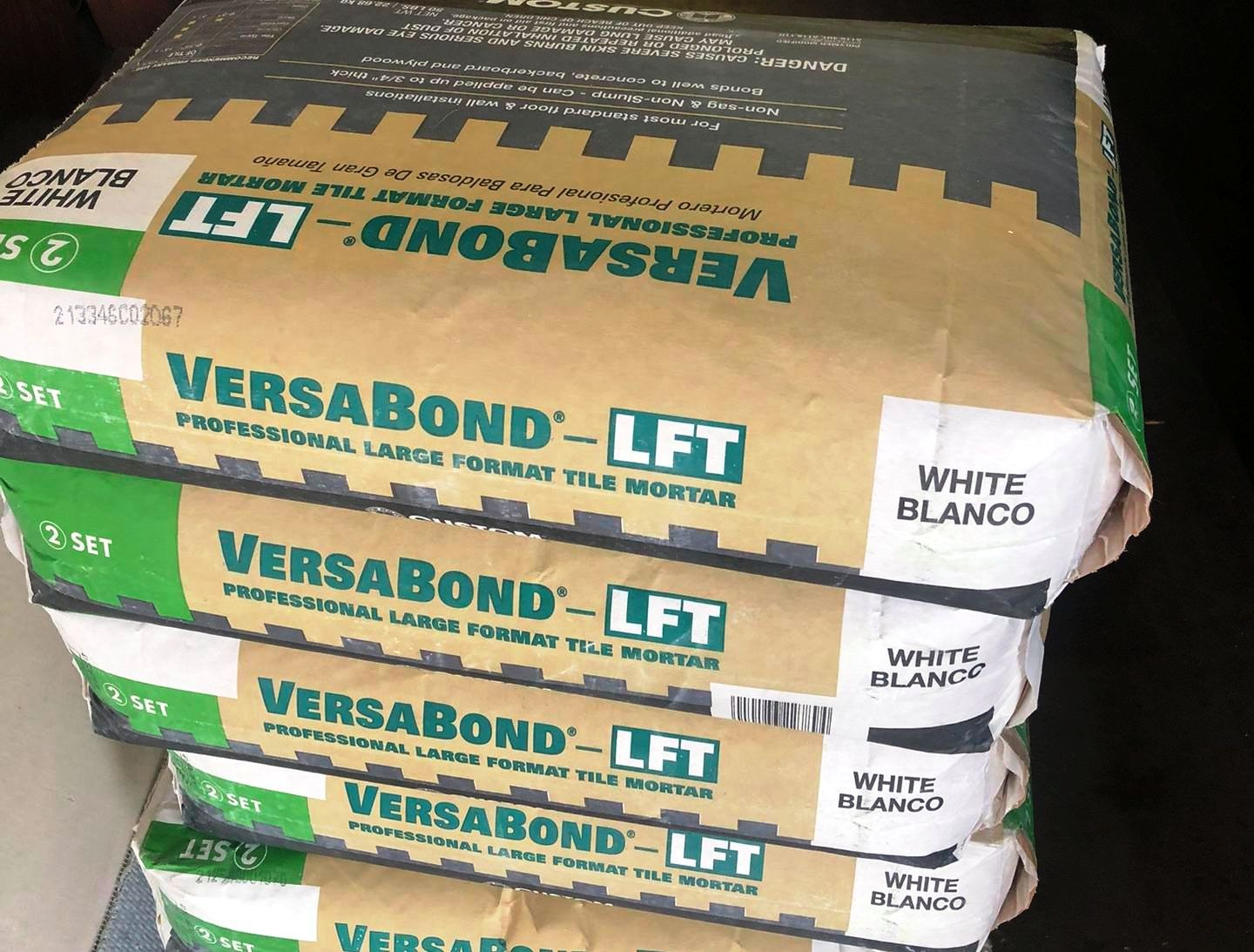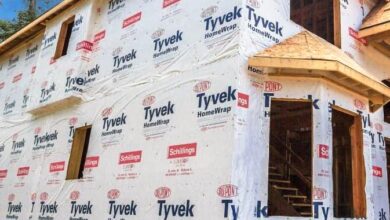Versabond vs. Mapei

Just wait until you reach the thinset if you thought selecting tiles for your project was difficult. The market is flooded with thinset brands. Every company guarantees unparalleled bonding strength and user-friendliness.
However, the formulations of these thinset brands vary from one another. You have to choose wisely because thinset is an important component of tile installation projects.
Reputable brands in the thinset market include Mapei and Versabond. If you are having trouble deciding between the two, we will point out their advantages and disadvantages so you can decide which is best for your tile installation project.
Versabond: What Is It?
Versabond is a versatile thinset that comes in a rich formula suitable for use in floor and tile applications. Versabond has outstanding bonding strength and can cure in cold climates as well.
The chemicals that give Versabond its performance are Portland cement, inorganic aggregates, copolymers, and other substances.
Versabond should be prepared for use by mixing it with clean water because it is supplied in a dry formula. You can find instructions regarding the appropriate ratios to use on the packaging.
Versabond has the advantage of a longer working time. To guarantee that the contents are distributed evenly, you should always stir the mixture after five to ten minutes.
Versabond is an excellent thinset mortar that is strong and adaptable. It’s critical to understand that Versabond has been altered, which elevates it above the majority of ordinary thinset mortars.
Versabond is useful in a lot of situations. It can be applied, for example, to tile and flooring installations. Considering that this is an all-purpose thinset mortar, that is not surprising. Plywood subfloors and granite, marble, and porcelain work well with Versabond.
It’s critical to understand that Versabond has certain restrictions. It should not be directly bonded to metal, hardwood, particle board parquet, sponge, or cushions, for example.
It won’t hold on these kinds of surfaces for very long. Please be aware that Versabond’s manufacturers do not advise using this tile for surfaces that are submerged in water, like swimming pools. Aside from the aforementioned drawbacks, Versabond is a great thinset mortar.
Mapei: What Is It?
One of the top brands in the thinset market is Mapei. Typically, the majority of their thinset mortars remain unaltered. Nonetheless, they do offer some modified choices, like the Mapei Ultralite Mortar.
Mapei thinset mortars are typically of the highest caliber, lightweight, and suitable for the installation of large and heavy tiles.
The non-sag feature of Maapei is one of the key features that most homeowners value. In addition, the Mapei thinset is designed to be incredibly simple to use.
You can select a Mapei thinset with a universal color formula if you’re interested. This can be applied to installations using light-colored stone or translucent marble.
Moisture poses a threat to most tile installation projects, so you’ll be happy to hear that Mapei excels in managing moisture. It resists mold as well.
Compared to a standard thinset, this brand of thinset mortar is designed to cover twice as much ground. Compared to other types of mortar, this implies that you will use less Mapei.
What Distinguishes Them?
- Compared to Mapei, Versabond has smaller sand grains.
Even though this is a one-time project, you will still need to become familiar with thinset terminology. When comparing thinset mortars, there’s a thing called sand grains.
The thickness of the sand that can support a tile’s weight depends on its grain. Greater weight capacity can be achieved by thinset with large sand grains.
Mapei has the bigger sand grain of the two. As a result, it is more substantial than Versabond. The Mapei thinset will not sag when bonding to larger tiles because of the size of the sand grains.
We suggest using Mapei if your project calls for the installation of larger tiles. Versabond is an option, though, if the tiles are very large and heavy.
- Versabond Takes Longer to Set and Work Than Mapei
The environment or working hours of these two are another obvious distinction. Thinset mortars have different setting times due to different formulas.
We suggest Mapei if you want to finish the tile installation project as soon as possible. Still, there are benefits and drawbacks to this. Let us explain further.
Because of Mapei’s quick setting time, you can finish the project as soon as possible. Versabond sets more slowly. But Versabond will give you extra time to fix any mistakes you make, like misalignment.
With Mapei, there is no room for that. Please take your time dismissing thinset mortar with a longer setting time if you are a novice or expect to make mistakes.
- A Greater Surface Area is Covered by Mapei
We noted that the Mapei thinset mortar covers twice as much ground as other thinset mortars when defining it. In this instance, Versabond is the common thinset mortar that is being discussed.
28 pounds of Mapei are required to cover an area of 85 square feet. Should you choose to employ Versabond. You’ll use fifty pounds, which is nearly twice as much as is required. You will cover the same area as Versabond with a small amount of thinset if you choose Mapei.
A more economical option for homeowners doing large tile installation projects is to use a thinnerset mortar with greater coverage.
- Mapei Can Withstand More Moisture Than Thinset
Thinset mortars are generally recognized to have some degree of moisture resistance. However, the moisture-resistant points of various thinset mortars vary. Mapei resists moisture better than the other product.
It won’t cause any damage to the tiles in the kitchen or bathroom. When installing Versabond in an area that receives a lot of moisture, you can’t be too sure.
Versabond Offers Lower Costs
The cost will vary based on where you purchase the thinset mortar. No matter where you compare the prices, though, you will find that Mapei is more costly.
As long as you maintain the same size or quantity, that is. Versabond is a better choice if you’re on a tight budget.
- The Bonding Strength of Versabond Is Higher
The largest disparity was to be saved for last. Versabond has a stronger bond than Mapei when compared to these two thinset mortars. Not that Mapei has particularly strong bonds. It’s only inferior to Versabond in terms of quality.
Versabond’s improved bonding strength can be attributed to the presence of modified agents. As we stated at the outset, the majority of Mapei thinset mortars are original.
Versabond thinset mortars, however, are altered. By “modified,” we mean that it has been given additional polymers to increase adhesion and strength.
Choose the thinset mortar with a stronger bond if you are shopping for one. This will guarantee that the tile sticks to the walls securely.
What Similarities There Are Between Them?
- They both encourage tiles to stick to walls or cement boards.
You can be sure that the tiles will properly adhere to the wall or cement board regardless of which option you select, despite the fact that these two have some notable differences.
- Both are Items from Reputable Manufacturers
Reputable brands in the tile installation industry are Mapei and Versabond. Versabond or Mapei is recommended by numerous experts. It should be evident from the descriptions above why both are wise decisions.
What Makes Versabond Better?
Versabond lacks many of Mapei’s noteworthy features. However, one feature sets it apart: it has been altered. It has a stronger bonding power because it is a modified thinset mortar.
Versabond ought to be your first choice if you’re looking for a tile installation adhesive that will guarantee the tiles stay attached to the wall for many years.
It’s also a less expensive option. Please be aware that some of Mapei’s exceptions are equally strong despite being altered with polymers.
What Makes Mapei Better?
We have a few preferences regarding Mapei thinset mortar. Its sand grain is more noticeable, to start. As a result, it can support heavier and larger tiles without collapsing.
This is the thinset that you should use if you are installing large tiles. Second, the setting time of Mapei is shorter. It appears to be a reasonable choice if you’re in a rush. Moreover, it resists moisture better than Versabond.
Remember that it has a greater surface area. However, the fact that Mapei is more expensive rules that out.
Who and Why Should Use Mapei?
Because Mapei sets faster, it’s best suited for experienced tile installers or professional builders; nevertheless, use caution when installing Mapei.
a skill that only professionals possess. Aside from that, Mapei has a lot of advantages, like greater moisture resistance and larger sand grains. These characteristics will guarantee a faultless tile installation job.

